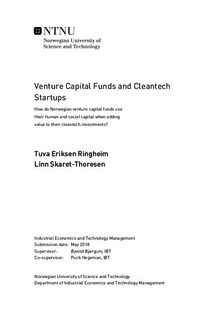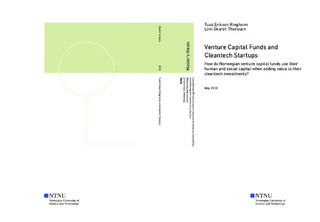| dc.description.abstract | In Norway the green change is on the agenda to develop new solutions that eventually can solve the world s sustainability challenges. To achieve this, cleantech startups play an important role, as they often are the ones to initiate the sustainability-transformation of established industries. Cleantech startups are typically dependent on venture capital (VC) to succeed, as they are often too risky to obtain traditional funding and are dependent on VC funding and additional value added. There is a vast amount of literature on VC funds value added, as well as their investment model. However, the string of literature connecting VC funds and value added to the cleantech context is very limited. The literature further shows that human and social capital both have a large impact on the performance of VC funds in general, but that there is a gap when it comes to research in a cleantech context. Thus, the purpose of this master thesis is to identify how Norwegian VC funds add value to their cleantech investments, and which aspects of human and social capital they draw upon to create this added value.
Qualitative case studies have been carried out, with five Norwegian VC funds serving as case companies. Empirical data has been collected through semi-structured interviews, then analysed using an abductive approach and a framework created by the authors based on existing theory. The framework allows for a detailed, two layered analysis, encompassing the complexity of the paper s research questions, while also providing structured and consistent results.
The findings show that the most important value adding inputs for Norwegian VC funds investing in cleantech were; outreach, recruitment, strategizing and consulting. Bridging social capital and industry specific human capital have the highest importance across all value adding inputs. However, there seem to be a gap between how much industry specific human capital Norwegian VC funds have, and how much is needed to invest successfully in the cleantech industry. Outreach is particularly reliant on social capital, recruiting on bridging social capital, strategizing on industry specific human capital and bridging social capital, and consulting on industry specific human capital. Funds lacking industry specific human capital typically hired external consultants to conduct consulting activities. Additionally, it was identified that mandating, although not focused on by Norwegian VC funds today, could have a significant contribution for the development of cleantech startups, and that this activity is particularly dependent on human capital to be conducted efficiently. | |

